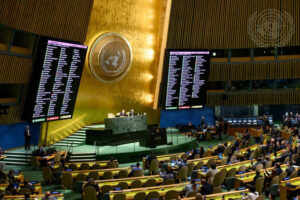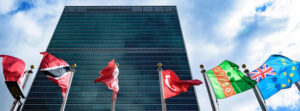
Armed Conflicts, Civil Society, Global Governance, Headlines, Human Rights, IPS UN: Inside the Glasshouse, Middle East & North Africa, TerraViva United Nations

Credit: United Nations
The UN, which was established to foster global peace and stability, has now become a paralyzed institution that inadvertently contributes to raging conflicts because it is constrained by an archaic structure that no longer meets the dramatically changed world order.
– The United Nations, established in 1945 at the end of World War II, has sadly virtually outlived its usefulness as it commemorated its 79th anniversary due to its failure to reform itself and adjust to the new world order following the collapse of the Soviet Union, which is significantly different from when the UN was established.
The UN’s mission, which is to promote peace and stability, has failed time and again, as many of the current violent conflicts, especially the Ukraine War and the Israeli-Palestinian conflict, glaringly demonstrate.
As Ukrainian President Volodymyr Zelenskyy aptly put it when he asked during his address to the Security Council in 2022: “Where is the security that the Security Council needs to guarantee? … Where is the peace?”
Over the years, scholars and think tanks have offered reformist ideas to make the UN more adaptable and responsive to the changing world order. They have failed primarily because of how the UN was structured and the opposition of the five permanent members of the United Nations Security Council (UNSC) – the US, Russia, China, Britain, and France – to any significant reforms that could diminish their power.
Offering any comprehensive reforms to the UN is certainly beyond the scope of this column. However, there are some limited reforms that the UNSC can take, without a fundamental change in its structure, to enhance its effectiveness in maintaining global peace.
Before that, it is essential to point out some of the UN’s shortcomings to put into context the limited reforms that can be taken.
The UN Security Council’s structure
The UN Security Council’s structure, particularly the veto power held by its five permanent members, often leads to inaction. This power allows any one of these countries to block resolutions, even if there is broad international support. This has resulted in deadlocks on critical issues such as the Syrian Civil War, the Ukraine War, and the Israeli-Palestinian conflict.
The killings of civilians and the destruction of cities and towns, particularly by Israel and Russia, are devastating and continue unabated even through the UN and its humanitarian agencies. The International Criminal Court and UN human rights experts have repeatedly called on the Security Council to act. In these cases, the US and Russia’s adversarial relations prevented them from reaching solutions to mitigate these conflicts.
The composition of the Security Council does not reflect current global dynamics, leading to questions about its legitimacy and effectiveness. Calls for reform have been persistent but largely unaddressed due to the reluctance of current permanent members to alter a system that benefits them.
Only one-quarter of the global population is represented by the Security Council. Blocks of countries, including Muslim states, African nations, South American countries, and India, with over 1.3 billion people, are not represented in the SC.
Peacekeeping Constraints
The UN peacekeeping missions are often criticized for their limited mandates and resources. Peacekeepers are usually deployed in areas where there is no peace to keep, like Cyprus, Kosovo, and Western Sahara. They are generally not adequately equipped or have the authority to engage in violent operations.
This limitation is starkly evident in regions plagued by terrorism and violent extremism, including the Sahel region in Africa, the Democratic Republic of Congo, and the Central African Republic, where peacekeepers struggle to stabilize situations without adequate support from powerful nations. In addition, there is often a disconnect between UN mandates and local realities, which complicates peacekeeping efforts.
Peacekeepers may not be adequately trained or prepared to handle complex regional dynamics, leading to ineffective interventions.
Lack of Enforcement Mechanisms
The UN often lacks effective enforcement mechanisms for its resolutions. While the Security Council can theoretically impose sanctions or authorize military action, veto power and political considerations frequently prevent decisive actions. This allows countries that are committing crimes against humanity or engaged in war crimes to escape any punitive measures with impunity, even when imposed by the UNSC.
National Interests Over Global Peace
The interests of powerful member states often precede collective global security objectives. The major arms-exporting nations are also permanent members of the Security Council, creating conflicts of interest that undermine efforts to resolve disputes where these nations have strategic interests.
This is highly evident in the Israel-Hamas war and Russia-Ukraine wars, where the US, in particular, is providing massive military support. In this context, geopolitical rivalries among major powers hinder consensus on critical issues. For example, China and Russia often align against Western countries on various international matters, leading to a stalemate in effectively addressing conflicts.
Bureaucratic Inefficiencies
Slow bureaucratic processes and mismanagement frequently hamper the UN’s operations. These inefficiencies can delay critical humanitarian aid and other interventions necessary for maintaining peace. Addressing these issues would require substantial reforms, particularly within the Security Council, alongside a commitment from member states to prioritize global peace over national interests.
Reforms that Can Enhance Effectiveness of UN Operations
Given, however, the insurmountable difficulties in undertaking comprehensive reforms of the UN, it is still possible to reform the UNSC to enhance its effectiveness in maintaining global peace, which involves addressing several key issues. Here are several doable reforms that could rectify some of the problems.
Reform proposals include limiting the use of vetoes, particularly in cases involving mass atrocities or violations of international law. This could include requiring a supermajority for vetoes to be effective or mandating discussions in the General Assembly following a veto.
Regional Representation
Ensuring geographic balance and representation of diverse cultures and civilizations is crucial. This could involve creating regional seats that rotate among countries within a region, thereby enhancing representation without significantly increasing the number of permanent seats.
Strengthening the Role of the General Assembly
Enhancing the General Assembly’s role in peace and security matters could counterbalance Security Council paralysis. Initiatives like the “Uniting for Peace” resolution allow the General Assembly to act when the Security Council is deadlocked. Given the differing national interests and geopolitical considerations, consensus-building can still be achieved without necessarily compromising national interests.
Non-amendment Reforms
Reinterpreting existing UN Charter provisions may allow for more flexible responses to global crises without formal amendments. Such reforms could empower other UN bodies to act when the Security Council cannot.
Balancing Power Dynamics
Expanding membership while managing veto power requires careful negotiation to ensure new members do not exacerbate gridlock. There is also concern about maintaining the council’s effectiveness with an increased number of members.
Expansion of Membership
Increasing permanent and non-permanent members is a widely discussed reform. This expansion could include adding new permanent members without veto power, such as countries from underrepresented regions like Africa, Latin America, and Asia. The G4 nations (Brazil, Germany, India, and Japan) and African countries have been prominent candidates for permanent seats.
Although there is broad agreement on the need to reform the UNSC, achieving that involves piloting multifaceted geopolitical landscapes and balancing various national interests. That said, incremental changes, especially those not requiring formal amendments to the UN charter, may offer a feasible path forward.
If the UNSC does not adopt some of these reforms, the UN will virtually outlive its usefulness, especially in the area of conflict resolution, where the daily horrific death and destruction around the world attests to its dismal failures.
Dr. Alon Ben-Meir is a retired professor of international relations, most recently at the Center for Global Affairs at New York University (NYU). He taught courses on international negotiation and Middle Eastern studies.
IPS UN Bureau











